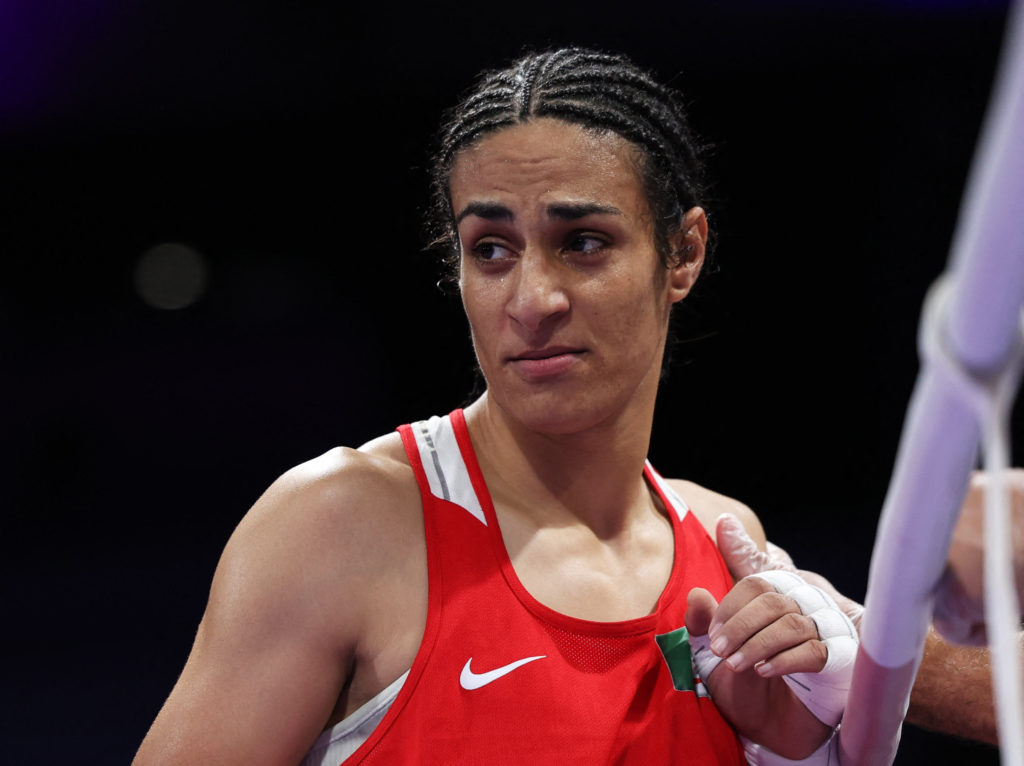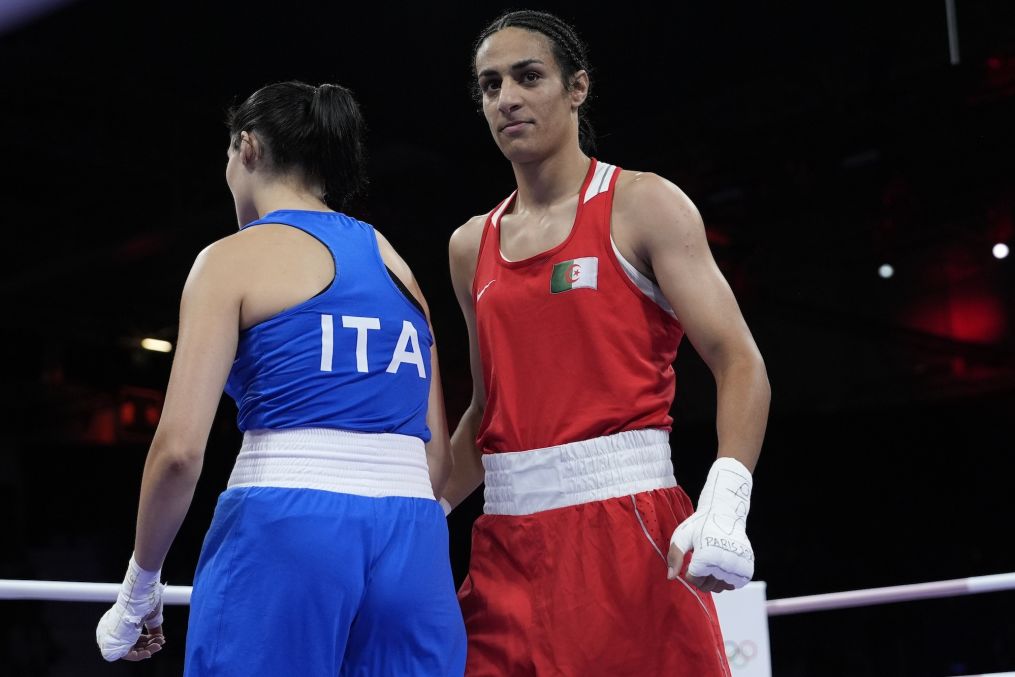
Algerian boxer Imane Khelif is at the centre of a bitter row over her eligibility to take part in the Olympics after a rival abandoned a bout after just 46 seconds.
Khelif, a 25-year-old light welterweight, landed a heavy first punch in Thursday’s fight against Italy’s Angela Carini, knocking off her chin guard. Subsequent blows pushed Carini back into her corner before she fell to her knees.
The bout raised questions about Khelif’s participation. In 2023, a now-discredited boxing governing body declared her unfit for the women’s tournament after she apparently failed what has been described as a gender eligibility test.
But the International Olympic Committee (IOC) strongly supports her participation in the 2024 Games, with its spokesman, Mark Adams, saying she was “born a woman, she was registered as a woman, she lived her life as a woman, she boxed as a woman, she has a female passport.”
“This is not a case of transgenderism,” Adams added.
Khelif has become a flashpoint in an often misinformed debate about how a woman can compete in the sport.
As Khelif prepares for her next bout on Saturday, here’s what to know:
Who is Imane Khelif?

Khelif is an accomplished amateur who won a silver medal at the International Boxing Association world championships in 2022.
But in March 2023, Khelif was in the spotlight for another reason: the IBA disqualified her from a gold medal bout, saying a test showed she “did not meet the necessary eligibility criteria required” and was “found to have competitive advantages over other female competitors.”
The IBA, which had its recognition as the official boxing body for the Games withdrawn by the IOC over corruption and finance-related issues, also disqualified Taiwanese featherweight boxer Lin Yu-ting for the same reason.
The IBA did not say what test the pair had undergone. “The athletes did not undergo a testosterone test, but a separate, recognised test, the details of which are confidential,” it said.
IOC spokesman Adams rejected the IBA test, calling it “arbitrary”, and said the pair were disqualified by the IBA “without any due process”.
Who is involved?
Khelif has been subject to a torrent of online abuse, with prominent anti-trans figures, right-wing commentators and politicians incorrectly calling Khelif a man and using the controversy to fuel the wider culture war around gender identity.
Former US president Donald Trump, Elon Musk, JK Rowling and WWE wrestler turned social media influencer Logan Paul have all weighed in. “Watch this and then explain why you are okay with a man beating a woman in public for your entertainment,” Rowling wrote on X, amplifying misinformation about Khelif’s gender.
Italy’s Giorgia Meloni, who was visiting Italian athletes at the Olympic Village on Thursday, said the competition was “not an equal fight”. Italy’s right-wing prime minister said she is opposed to athletes with "genetically masculine" characteristics competing against women from 2021.
Many athletes have written in support of Khelif, including Irish boxer Amy Broadhurst – who fought and beat Khelif at the World Championships. Broadhurst posted a photo of the pair before their 2022 bout at X, saying: "Please, hate is ridiculous."
The controversy has not only overshadowed Khelif’s victory, but also has implications for her privacy and security. For example, in her native Algeria, freedom of expression is severely limited, and being gay or transgender is illegal.
Still, the Algerian Olympic Committee (COA) has strongly defended its athlete: "Such attacks on her personality and dignity are deeply unfair, especially as she prepares for the pinnacle of her career at the Olympic Games."
"The COA has taken all necessary measures to protect our champion," he added.
What do we know about sex testing?
Sex testing in sport has come under scrutiny from groups such as Human Rights Watch, who say it violates fundamental rights to privacy and dignity.
The sex tests that the IBA says disqualified Khelif and Lin from competing in 2023 are confidential, so there is no way to know exactly why they were banned from competing last year.
Athletes with differences of sexual development (DSD) often undergo such testing. (Khelif, however, has not said she has DSD.)
DSD is a group of conditions related to genes, hormones and reproductive organs, and can be associated with a condition in which the female body naturally produces more testosterone than others. DSD traits only become apparent at puberty, when secondary sexual characteristics such as facial hair, breast tissue or distinct body shapes begin to develop.
It is difficult to estimate how many people have DDS traits – many live their whole lives without knowing they have them. Scientists estimate that one in 50 people are born with DDS traits. A person with DDS can have any gender identity.
Ahead of the Paris Games, the IOC introduced new rules and regulations regarding athletes with DDS.
The IOC rules state that inclusion should be the norm in such cases and that athletes with DDS should only be excluded from the women’s competition if there are clear equity or safety concerns.
The IOC reiterated on Friday that all athletes competing in the boxing tournament "meet the eligibility and registration rules of the competition, as well as all applicable medical rules."
The IOC’s Adams added, however, that she understood the concerns that had been raised around testing, fairness and safety.
"Everyone wants a black-and-white explanation of how we can determine this. That explanation does not exist in the scientific community or anywhere else," she said.
Is sex testing in sport new?
Surveillance of women’s bodies in sport is nothing new, with the practice of systematic medical examinations beginning around the 1936 Berlin Olympics.
At the 1966 European Athletics Championships in Budapest, women underwent a visual examination of their genitalia and secondary sexual characteristics, carried out by a panel of three female doctors. The examinations have been referred to as "naked parades".
It was not until the 1990s, when blanket sex testing was abandoned by many major sporting bodies, including the IOC in 1999, which now carries out medical assessments on a case-by-case basis.
South African Caster Semenya, a double Olympic 800m champion, who has naturally higher testosterone levels associated with DDS, remains at the centre of this debate. Since 2019, she has been banned from competing in certain competitions under World Athletics regulations unless she takes medication to reduce her testosterone levels. Earlier this year she appeared before the European Court of Human Rights (ECHR) to continue her challenge against the sporting body.
In recent years, as debate around women’s bodies in sport has grown, governing bodies in athletics, cycling, swimming and rugby have tightened their regulations to exclude competitors who have gone through male puberty from female events.